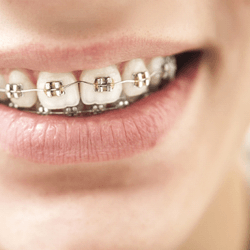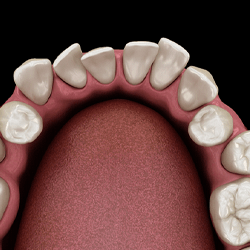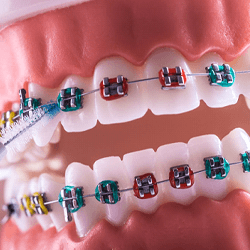Traditional Braces – Wellesley, MA
Straighten Your Smile for Improved Oral Health

Misaligned teeth can cause a range of oral health problems, including an increased risk of cavities and gum disease. Speech and bite function may also be affected. Fortunately, there are ways to address crooked teeth, including traditional braces in Wellesley. This tried-and-true treatment can work for even complex cases. Read on below to learn more about it and what you can expect with it. Get in touch with us when you are ready to schedule an orthodontic consultation.
Why Choose Wellesley Dental Group for Traditional Braces?
- Experienced & Highly Qualified Team
- Multiple Types of Braces Available
- Improve Your Appearance and Oral Health
How Do Traditional Braces Work?

Traditional braces have two primary components. There are brackets, which we bond onto the teeth. An arch wire connects those brackets. Together, the wire and brackets apply consistent, gentle pressure to the teeth to move them into their proper positions. Adjusting the wire every 6 – 8 weeks ensures that patients continually make progress with their treatment.
Total treatment time with braces varies from case to case, but most patients see ultimate results in 18 – 36 months.
What Orthodontic Issues Can Braces Fix?

Braces are much more than a cosmetic treatment. In fact, they can significantly improve oral health by addressing issues such as misaligned bites, crooked teeth, gaps between the teeth, and more. During your consultation, we will be able to let you know what braces may be able to accomplish in your unique case.
Bite Misalignment
Overbite, underbite, crossbite, and open bite are all forms of malocclusion (bad bite). These issues can contribute to teeth grinding, speech problems, TMD, and more. Braces, often with the help of accessories like elastics, can shift the teeth and train the lower jaw to rest in the proper position, leading to a more harmonious bite.
Crowded & Crooked Teeth
Crowded teeth can easily trap food between them, leading to a heightened risk of bad breath, tooth decay, and gum disease. Fortunately, braces can help to give each tooth the space it needs to function optimally. This may be accomplished with the help of extractions, special orthodontic accessories, or other aids.
Gapped Teeth
While a gap between the teeth is often regarded as a purely aesthetic issue, it can have consequences for gum health. To close empty spaces, braces can move the teeth closer together, thereby creating a more attractive smile that is at a lower risk of a number of oral health issues.
Caring for Your Braces

Here are some practical tips for caring for braces:
- Diligently attend all recommended appointments with your orthodontist or dentist in Wellesley.
- Stick to a thorough oral hygiene routine. You should brush and floss after each meal, drink plenty of water, and use special tools to clean around your braces.
- Avoid foods that might damage your braces, such as extremely sticky or chewy items. For example, things like gummy bears and pizza crust should be avoided. It is also smart to avoid foods that can easily get stuck in braces, such as popcorn.
